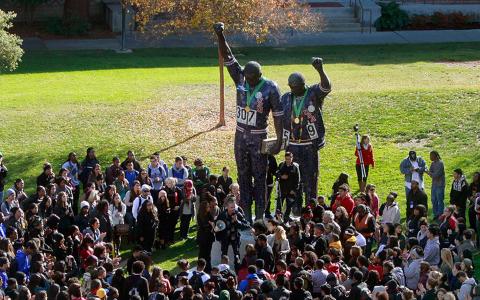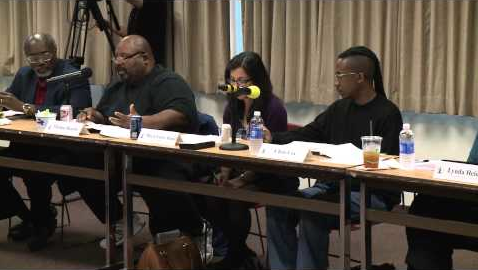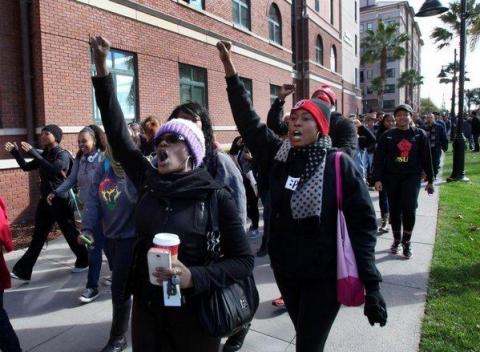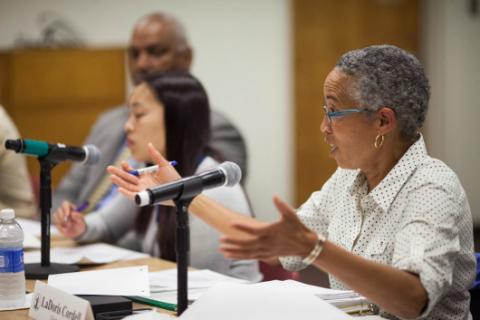 |
|
Students gather to protest against racist activites at San Jose Sate University. (Photo credit: Karl Mondon/AP Images) |
Not In Our Town Facilitates Community Conversation at San Jose State University for Diversity Speaker Series
Last week, the University of Missouri President Tim Wolfe resigned after a series of campus protests including members of the University’s football team who said they would not participate in team activities until Wolfe was removed from office. They were supported by their coach, Gary Pinkel. Issues of racism on college campuses are not unique to the University of Missouri. Similar incidents with racism and other forms of hate have been identified and are being called out on campuses across the country, including recent incidents that have brought to light concerns by students of color at Yale. The most promising outcomes have occurred when students have joined forces with faculty, staff, and administration to tackle the issues at hand. At the University of Mississippi, the faculty and student senate came together and convinced the administration to remove the Mississippi state flag, which includes a Confederate emblem, from their campus.
 |
| Members of the SJSU Task Force meet in April to discuss racism and campus safety |
At San Jose State University (SJSU), a high-profile incident in 2013, followed by several other incidents brought the intersection of racism and campus safety into full view. Following the events, a Special Task Force on Racial Discrimination was formed and met throughout the remainder of the 2014 academic year. Retired Santa Clara County Superior Court Judge LaDoris Cordell chaired the task force that developed more than more than 50 recommendations that were eventually summarized into a 22-point Toward A More Welcoming Campus Community Action Plan focused on the following areas:
- Gathering best practices and engaging the university community in plans for an Office of Diversity, Engagement and Inclusive Excellence.
- Ensuring that visible, user-friendly tools are readily available to report hate crimes and inappropriate and bias-based conduct.
- Developing a comprehensive response protocol once incidents are reported.
- Creating a recruitment protocol that ensures diverse applicant pools for faculty positions.
- Developing and implementing training and programming on race, ethnicity and diversity for all campus community members including students who live and work in the residence halls.
As part of the Task Force efforts, SJSU provided funds for a Diversity Speaker Series. Education Professor Roxana Marachi reached out to NIOT and another partner organization, Community Matters, to facilitate a four-part series for students, faculty, staff, and community. The series asks participants to engage in open dialogue and share ideas and solutions, while they are trained in skill-building and upstander practices in order to find solutions to issues of safety on campus.
 |
| SJSU Students march together to protest hate incidents on their campus (Photo credit: Karl Mondon) |
The plans for the four-part series became all the more important in providing a forum for authentic dialogue and problem-solving. This fall, NIOS Director, Becki Cohn-Vargas together with Community Engagement Manager Cassandra Belson and a leader from the Bowling Green State University NIOT Initiative, Ray Plaza, facilitated two community conversations to bring sectors of the university together to explore ways to create a safe and inclusive campus. We showed the film, A Bowling Green Legacy, which details how students’ efforts to address racist incidents on their campus and in their town resulted in a campus and community-wide NIOT initiative. Ray Plaza, who currently serves as Director of Diversity and Inclusion at Santa Clara University, shared his thoughts about the powerful combination of students and university leaders working together. Plaza openly described some of the tensions and challenges his NIOT group faced when he had facilitated efforts at Bowling Green State University. He also shared how they worked through the tensions, redoubled efforts and are now going strong into their third year.
SJSU session participants, including students, faculty, leaders of the student and community campus groups and administrators, openly discussed current issues at SJSU, now two years since the original incident that spearheaded these efforts. At the first community conversation, the group identified several issues as the most pressing and in need of continued attention: the need for open dialogue, lack of support for underrepresented groups (homeless students, students of color, undocumented students, etc.), institutional racism, and concerns about physical safety on campus.
 |
| Judge LaDoris Cordell at a task force meeting in April (Photo Credit: James Tensaun) |
At the second community conversation, the group heard from Stacy Gleixner, SJSU Chief of Staff, about the efforts of the President’s Commission on Diversity. In addition, Maribel Martinez, Director of the Associated Students César Chávez Community Action Center, Bonnie Sugiyama, Director of the Pride Center and Gender Equity Center, and Caz Salamanca, Assistant Director of the MOSAIC Cross Cultural Center shared about a Diversity Awareness and Bystander Intervention training they had co-developed and presented to over 4,500 incoming students in Summer of 2015. Their presentation highlights the roots of social justice activism of the campus, described various aspects of diversity, and included strategies for incoming freshman to be empowered bystanders/upstanders when faced with situations that are hurtful or harmful to their peers. The community conversations aligned with the “See Something, Say Something” initiative to encourage more open discussion and facilitation of support.
Over the course of the two community conversations, it became clear that while the campus has many positive programs and strategies to address some of these issues, there is an ongoing need for improved coordination and communication. The group then discussed short and long-term strategies to address these issues and strengthen coordination. Some of the suggestions that were generated included:
- Developing communication-based apps to inform campus community members of campus-climate related events that would be of interest.
- Improving current communication processes and tools.
- Facilitating additional opportunities to provide community voices about issues that arise.
- Hiring a more diverse faculty and bringing diversity training that had been provided to freshman to the rest of the student body, as well as faculty and staff.
The sessions were characterized by authentic dialogue and a range of diverse perspectives. The planning group will meet to follow up and bring these ideas forward to take action on them. It is a good time to bring forward the ideas generated by the group as a director is being hired to set up the new Office of Diversity, Engagement and Inclusive Excellence.
This spring, Rick Phillips from Community Matters will lead the final two sessions designed to build upon the community conversations, and provide skill-building for campus leaders with tools for speaking up to address harmful or hateful behavior.
We commend the efforts of students, staff and faculty at SJSU to take on some of the most pressing issues facing colleges today. Efforts to adequately address racism and other intolerance on college campuses are not quick fixes. They require a multi-faceted approach and a team effort of students, faculty, administration, staff, and community to come together to say “Not On Our Campus”.
Add new comment